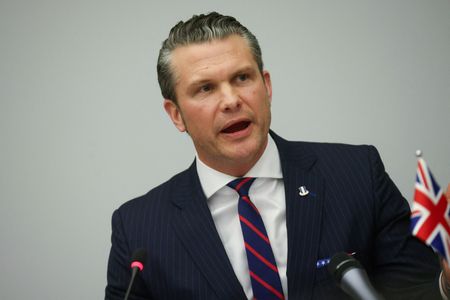By Lucinda Elliott
BUENOS AIRES (Reuters) – At Argentina’s Ministry of Deregulation and State Transformation, two piles of laws to be streamlined or cut sit on a wooden desk near an Elon Musk biography and a figurine of libertarian President Javier Milei with his iconic chainsaw.
This is the nerve center of the South American nation’s bold year-old experiment to slash regulation and the size of government, moves that are shaking up the embattled economy and drawing praise from U.S. President Donald Trump and Musk.
Argentina’s already well-entrenched streamlining model – though different in important ways – offers lessons for the United States, where Musk’s Department of Government Efficiency, or DOGE, is tearing through government departments, cutting costs and firing state workers in a way never seen before in Washington.
“We’ll have a more prosperous economy the smaller the size of the state,” Deregulation Minister Federico Sturzenegger, 59, told Reuters at his office, where he leads a small team he calls a “catalyst” for spending cuts and pruning regulation.
Under Milei – who credits Sturzenegger as the architect of his “chainsaw” approach – Argentina has halved the number of ministries to eight, downgrading ministries of education, culture, labor, gender and diversity and social development. The number of public sector workers fell 10% last year – nearly 40,000 jobs.
A hiring freeze and new “suitability” tests are also underway to assess whether public servants should be let go. The pass rate was 96% as of December, cooling some overreach concerns.
Musk has met Milei regularly in recent months and praised his austerity and state cutbacks for helping Argentina overturn a deep fiscal deficit after years of over-spending while bringing down triple-digit inflation. Poverty remains high, though it is coming down from a peak of more than 50% last year, and the country is emerging from recession.
“This is awesome,” Musk posted on January 25, linking to a video conversation with Sturzenegger discussing Argentina’s “deep chainsaw” cuts to government and regulation.
Argentina and the United States are, of course, different.
The South American country is trying to dig itself out of a deep recession — the latest economic crisis of many going back decades — with depleted reserves, damaging currency controls and debt loads it struggles to support. The U.S. economy, however, has been on a generally strong footing.
Milei has less guaranteed support in Congress than Trump does and he cannot rely on his own party, needing conservative allies to push through his reforms. Sturzenegger is a fully fledged minister while Musk’s DOGE is a newly created department, and its role is much disputed by Democrats.
Both governments show a strong dislike for the very apparatus they represent.
“We want to get the state out of the way,” said Sturzenegger, adding Milei may have helped Musk’s thoughts develop.
“They talked a lot before Trump’s election, I think Javier conveyed this to him and I think that was how it matured in some way, that’s my speculation, this idea of the DOGE,” he said.
TOO MUCH RED TAPE
Musk is now trying to cut three-quarters of federal government jobs, drawing criticism over how DOGE may be used to target government programs viewed as out of step with Trump’s “America First” conservative agenda.
Milei, meanwhile, has taken aim at red tape around rent controls, electric vehicles, farm export taxes and generic medicines, looking to encourage more competition and tame prices. Socially conservative, he’s cut funding for diversity bodies and soup kitchens, though hiked direct payouts to the poorest, helping temper protests and public anger.
Silvina Batakis, housing minister for Buenos Aires province who served under the previous leftist administration, said her constituents were suffering from the threat of permanent cuts.
“I believe in fiscal balance and a more efficient state, but this shouldn’t be achieved by taking away cancer patients’ right to medications or by destroying people’s retirement. People should be the first priority of any government,” Batakis told Reuters.
Polls show Milei is managing to maintain public support. In a January survey by Atlas Intel, 47% of respondents approved of the president, up from 43% in July and in line with the same period last year.
Milei argues that his pro-market policies have led directly to more investment and confidence, though part of Argentina’s growth is the recovery from a recession last year and is driven mainly by agriculture and energy exports.
He’s also looked to privatize state firms, though there has been push back from Congress.
Shaggy haired and bombastic, Milei won a shock election in 2023 pledging to do away with the state entirely if he could. He has said he wants to burn down the central bank and introduce the U.S. dollar as Argentina’s currency, though he has put his more radical measures on hold, focusing on reforms he can get done.
Argentina is arguably tied up in red tape, which has helped Milei remain popular despite the rising cost of living in dollar terms for regular Argentines.
The country ranked 159 out of 165 for regulatory burden in an index from Canadian libertarian think-tank the Fraser Institute. The World Bank’s 2020 Ease of Doing Business ranking had Argentina at 126, one place ahead of Iran.
Sturzenegger proudly points to the two towers of documents in his office wrapped in blue and white ribbon side by side – the pages of legislation he says need to be scrapped or revised. He started work on the laws two years before Milei came to office, he says.
He launched an online portal for tips from the general public on where to deregulate. He says he’s received 10,000 ideas in the past two months, which he then uses artificial intelligence to sort through and order.
He gave an example of local rules around watermelon exports that said they must be packaged a certain way – even if they had to be repackaged mid-journey for the end import market, adding to costs and gumming up trade.
Sturzenegger says the government – which has a year of leeway with emergency measures granted by Congress in June to push deregulation by decree – is revving things up. He has a count down clock in the ministry which when Reuters visited said “161 days” – the time remaining under the emergency measures.
“Now it’s time to bring the deep chainsaw, which is to go to each area and ask, what do you do?,” he said. “If you are on the list that we said no to, that area has to be closed. Closed.”
(Reporting by Lucinda Elliott in Buenos Aires; Editing by Adam Jourdan and Alistair Bell)











